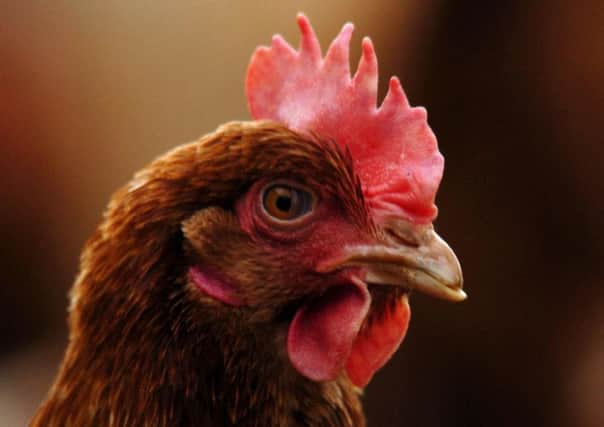Chickens banned from outdoors to prevent bird flu contagion


Robert J. Huey, Chief Veterinary Officer for the North, has declared an “Avian Influenza Prevention Zone” and suspended poultry gatherings across the North in light of the heightened risk of “Highly Pathogenic Avian Influenza H5N8”.
The prevention zone was ordered on December 23 for 30 days.
Advertisement
Hide AdAdvertisement
Hide AdKeepers of poultry and other captive birds are now required to keep their birds indoors, or take appropriate steps to keep them separate from wild birds.
The ban follows confirmation of H5N8 in poultry and wild birds in several countries across Europe, including a confirmed case on a turkey farm in England and the finding of H5N8 in a wild duck in Wales.
“While there have been no cases of H5N8 in Northern Ireland, the decision to declare a 30 day Prevention Zone and temporary suspension of bird gatherings is a precautionary measure to help reduce the risk of infection from wild birds,” said Mr. Huey.
“The Department is closely monitoring the situation in Great Britain and Europe and we have increased our surveillance in response to the heightened risk.
Advertisement
Hide AdAdvertisement
Hide Ad“The ban on gatherings (livestock fairs, auctions, shows or other events) applies to those attending with bird species which are considered at higher risk of spreading avian influenza, which includes all poultry and game bird species, ducks, geese and swans.
“Gatherings of pigeons, aviary birds and birds of prey can continue to take place,” he added.
“I would again urge poultry keepers in Northern Ireland to be vigilant and where necessary improve their biosecurity.
“Even when birds are housed there is still a risk of infection and biosecurity should not be compromised. Clothing and equipment should be disinfected, the movement of poultry should be reduced and contact between poultry and wild birds should be minimised,” said the vet.
Advertisement
Hide AdAdvertisement
Hide AdAs part of routine wildlife disease surveillance, post-mortem examinations of birds are undertaken in incidents where any ‘at risk’ bird species (wildfowl or gulls), or five or more birds of any other species, are found dead in the same location and at the same time.
As the island of Ireland is a single epidemiological unit the Department is working closely with their counterparts in the Republic of Ireland to ensure that consistent and proportionate measures to protect the island of Ireland are applied.
Advice from Public Health England is that the risk to public health from the virus is very low and the Food Standards Agency has made it clear that bird flu does not pose a food safety risk for UK consumers. Thoroughly cooked poultry and poultry products, including eggs, are safe to eat.
WHO said H5N8 could ultimately affect humans.
“Human infection with the A(H5N8) virus cannot be excluded, although the likelihood is low, based on the limited information obtained to date,” WHO has warned.
Advertisement
Hide AdAdvertisement
Hide Ad“It should be noted that human infection with A(H5N6) of related clade 2.3.4.4 has already occurred. WHO will re-assess the risk associated with the virus when more information is available,” it added.